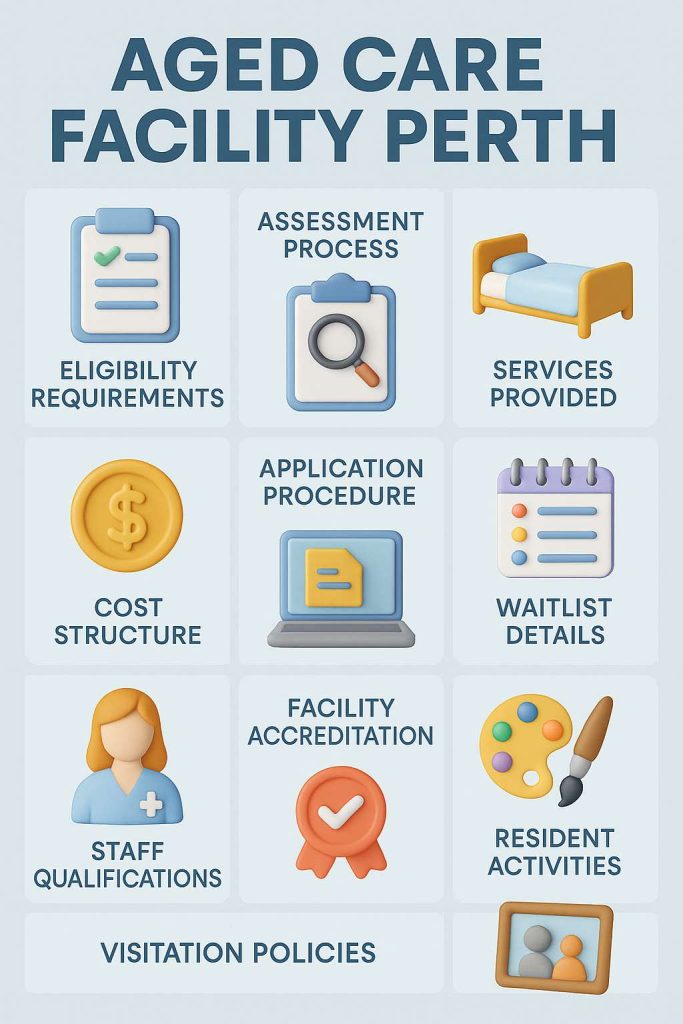When exploring options for Aged Care Perth, families often have essential questions regarding eligibility, assessments, costs, and quality of care. Below is a structured overview addressing the main factors to consider before selecting an Aged Care Facility Perth.
Eligibility Requirements
Entry into a residential aged care home typically requires that an individual is aged 65 years or older (50+ for Aboriginal and Torres Strait Islander people) and demonstrates a need for daily living assistance or nursing care. Eligibility is confirmed through an official government assessment.
Assessment Process
An Aged Care Assessment Team (ACAT) evaluation is mandatory. The ACAT determines the level of care required—ranging from basic support to full-time nursing. The process involves interviews, health assessments, and discussions about living needs. Applications can be made online via My Aged Care or through a general practitioner referral.
Services Provided
Facilities offer a wide range of services including personal care, medical support, medication management, physiotherapy, social activities, and meal preparation. Many also provide palliative care, dementia-specific support, and allied health services such as podiatry or speech therapy.
Cost Structure
Aged care fees are divided into several categories:
- Basic Daily Fee: Covers meals, cleaning, and utilities.
- Means-Tested Care Fee: Based on income and assets.
- Accommodation Payment: May be paid as a lump sum or daily rate.
- Additional Services Fees: Optional extras such as premium rooms or lifestyle programs.
Government subsidies are available depending on the resident’s financial situation.

Application Procedure
The process begins with the ACAT approval, followed by selecting preferred facilities, submitting applications, and undergoing interviews or tours. Once a place is offered, financial arrangements and legal documentation (such as care agreements) are finalised before admission.
Waitlist Details
High-demand facilities often maintain waitlists. Priority is determined by care needs, urgency, and availability of suitable accommodation. It’s advisable to apply to multiple facilities and stay in regular contact with admissions teams.
Staff Qualifications
Registered nurses, enrolled nurses, and qualified care assistants form the core team. Staff undergo regular training to maintain compliance with clinical standards and to ensure residents receive safe, compassionate care. Many facilities employ specialised staff for dementia and palliative care.
Facility Accreditation
Accreditation by the Aged Care Quality and Safety Commission confirms compliance with national care standards. Accredited facilities undergo periodic audits assessing quality indicators such as safety, health outcomes, and resident satisfaction.
Resident Activities
Social and lifestyle programs are integral to wellbeing. Activities may include art classes, music therapy, gardening, group outings, and cultural events, all designed to encourage engagement and maintain mental and physical health.
Visitation Policies
Visitation policies prioritise resident wellbeing while ensuring safety. Families can typically visit daily, with after-hours access arranged upon request. Most facilities also offer virtual visits through video calls to maintain family connections.
Conclusion
Selecting the right aged care facility in Perth requires understanding eligibility, available services, and financial obligations. By reviewing accreditation, staff expertise, and activity programs, families can make informed choices that support both quality of life and peace of mind.
